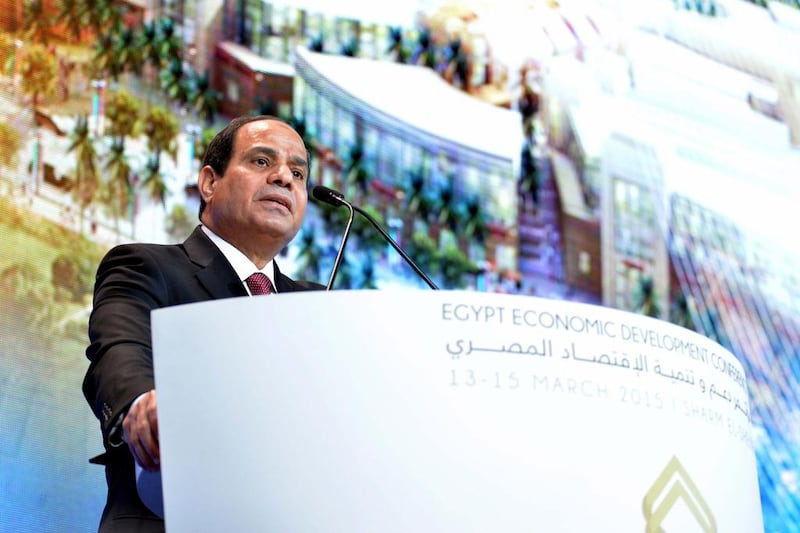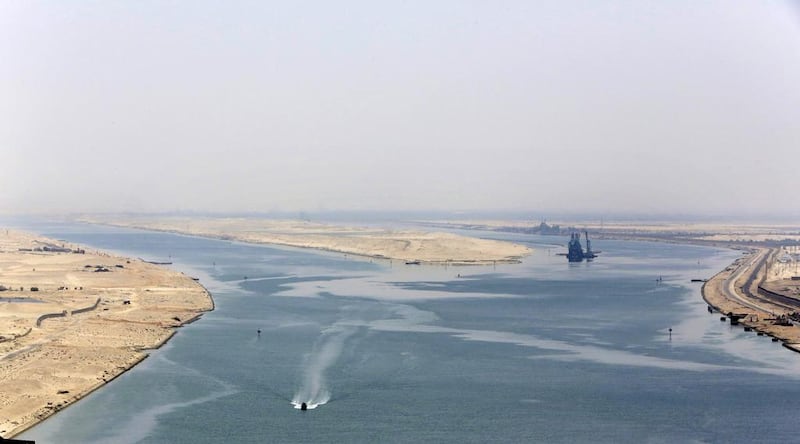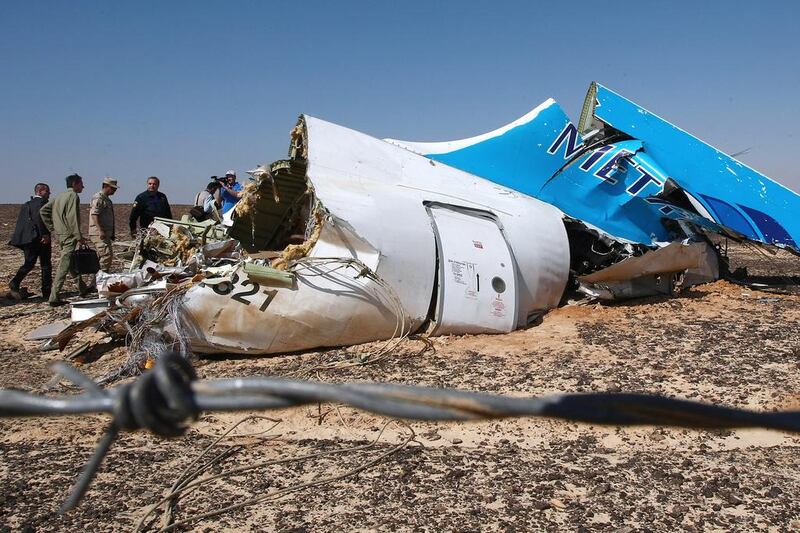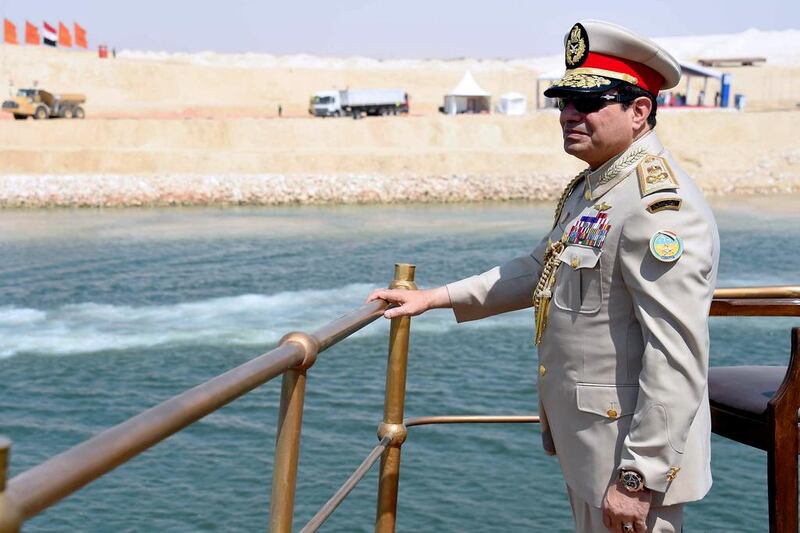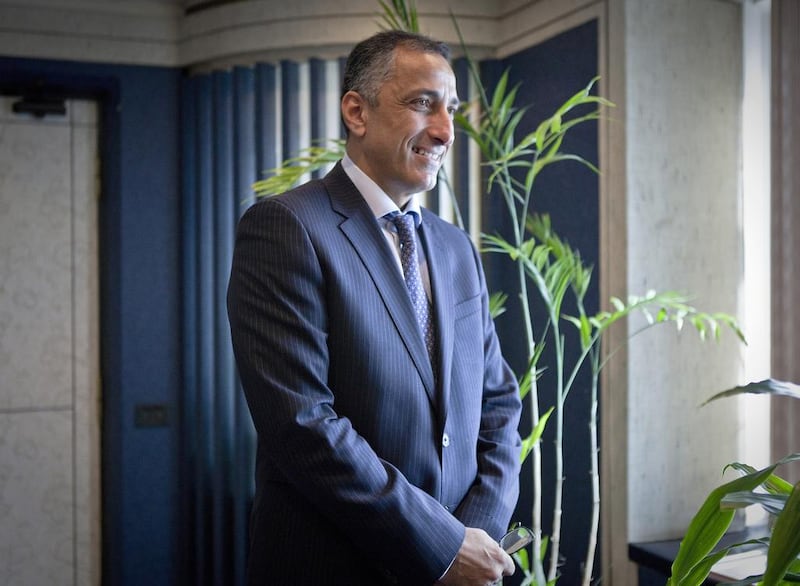Flanked by warships and with fighter jets and helicopters roaring overhead, the historic presidential yacht Mahrousa carried a triumphant president Abdel Fattah El Sisi through Egypt's newly opened channel alongside the Suez Canal.
The August 6 gala was the high point of a year otherwise marred by high inflation,stagnant growth and several unexpected disasters that have wreaked havoc on the Egyptian economy. The government, despite best intentions, has so far been unable to pull the country out of five years of malaise since the 2011 uprising.
Mr El Sisi stood on August 6 aboard the Mahrousa, the first ship to pass through the canal at the original 1869 opening, waving to onlookers onshore as folklore dance troupes performed. Egyptian flags adorned streets across the country.
“Egyptians have made a huge effort so as to give humanity this gift for development and construction,” the president declared amid a crowd of foreign leaders, including Sheikh Mohammed bin Rashid, UAE Vice President and Ruler of Dubai; the French president, François Hollande; the Russian prime minister, Dimitry Medvedev; King Abdullah of Jordan; the emir of Kuwait; and the king of Bahrain.
Built at a cost of US$8 billion, the new 35-kilometre channel runs parallel to the original 193km canal. The expansion also involves the deepening of 37km of channels through two lakes and has shaved off up to a day in waiting and transit time for ships using the waterway.
The government predicted it would boost the canal’s annual revenue to $13.23bn by 2023 from just more than $5bn in 2014. But in the few months since the opening, at least, year-on-year revenue has actually decreased as a slump in world trade cut into shipping.
The search for dollars was the theme that dominated the entire year.
Scarcely had 2015 begun when the Egyptian central bank began running out of foreign currency, throwing the economy into crisis. The bank let the official price of the pound weaken from 7.14 per dollar on January 18 to 7.60 two weeks later. It then tried to stamp out the black market, where the pound traded at 7.84, by restricting the amount of foreign currency companies could deposit into their bank accounts, making it hard for them to collect dollars for pay for imports.
The new currency regime was just in time for the Sharm El Sheikh economic conference in March, an extravaganza led by the president that gathered in thousands of investors in a show of support for the country and a sign that life was returning to normal.
The conference was declared a grand success, with tens of billions of dollars in new mega-projects announced and old ones dusted off, including a whole new capital city east of Cairo, a plan to reclaim a million feddans (420,000 hectares), the exploration for and development of natural-gas fields off the Mediterranean coast and development of the area around the Suez Canal.
The new capital comes with an eventual price of as much as $300bn. It was to boast an airport larger than London’s Heathrow. The government has yet to close a deal with UAE investor Mohamed Alabbar, reportedly because of a disagreement over finances. It now plans to potentially go it alone, with an Egyptian company leading the project.
Hardly had the Sharm conference ended when the currency black market returned in force, with the central bank still unable to meet demand for dollars. In early July, the bank depreciated the pound again, to 7.73 pounds to the dollar. By now traders were finding it hard to export, because the overvalued currency made Egyptian products expensive to buy, and hard to import, because they couldn’t get ahold of dollars.
The economy continued to stagnate. Inflation was 11 per cent year-on-year in November, and the stock market’s main index was down 25 per cent year-to-date as of Sunday. The widely watched purchasing managers index (PMI), which is based on a survey of hundreds of private firms, showed business activity shrinking in almost every month of 2015. It fell to 45.0 in November, its lowest in two years, with any reading below 50 indicating negative growth.
One of the few bright spots in the economy was the August 30 announcement by Italy’s Eni that it had discovered an enormous gasfield in deep waters off Egypt’s northern coast. With an estimated 30 trillion cubic feet of gas, the new Zohr field promises to be the biggest ever found in the Mediterranean. The field could earn Egypt several billion dollars a year, partly by letting it avoid costly imports of liquefied natural gas, when it comes online sometime in 2017.
BP likewise said in October that it would start producing gas at its north Alexandria concession in early 2017 and expected to produce up to 1.2 billion cubic feet of gas a day by late 2019.
In September a new government, led by the oil minister Sherif Ismail, was appointed, but most ministers involved in forming economic policy remained in their posts. The big change came a few weeks later with the appointment on October 21 of a new central bank governor, Tarek Amer, who had been deputy governor when the bank let the pound float in 2004, giving him a reputation of being a reformer and raising hopes among business leaders that he would let the pound weaken.
Mr Amer arrived just as the country suffered unexpected blows to what remained of its fragile tourism industry, wreaking further havoc on its already meagre inflow of foreign currency.
On September 13, Egyptian army aircraft by mistake attacked a convoy of Mexican tourists in the desert 250km south-west of Cairo, killing eight Mexicans and four Egyptians.
Then seven weeks later, on October 31, an airplane en route to Russia from Sharm El Sheikh fell from the sky, killing all 224 people on board. Egypt’s government says it has found no evidence of terrorism, but Russia and other governments said they believed the plane was brought down by a bomb, and several countries, led by Russia and Britain, put moratoriums on flights to the country.
By late December there was little indication the new central bank governor would let the pound weaken. To the contrary, the central bank actually strengthened the currency in October, and in December the government arranged as much as $20bn in loans from international financial institutions and Arabian Gulf governments, which presumably it would use to continue defending the pound.
business@thenational.ae
